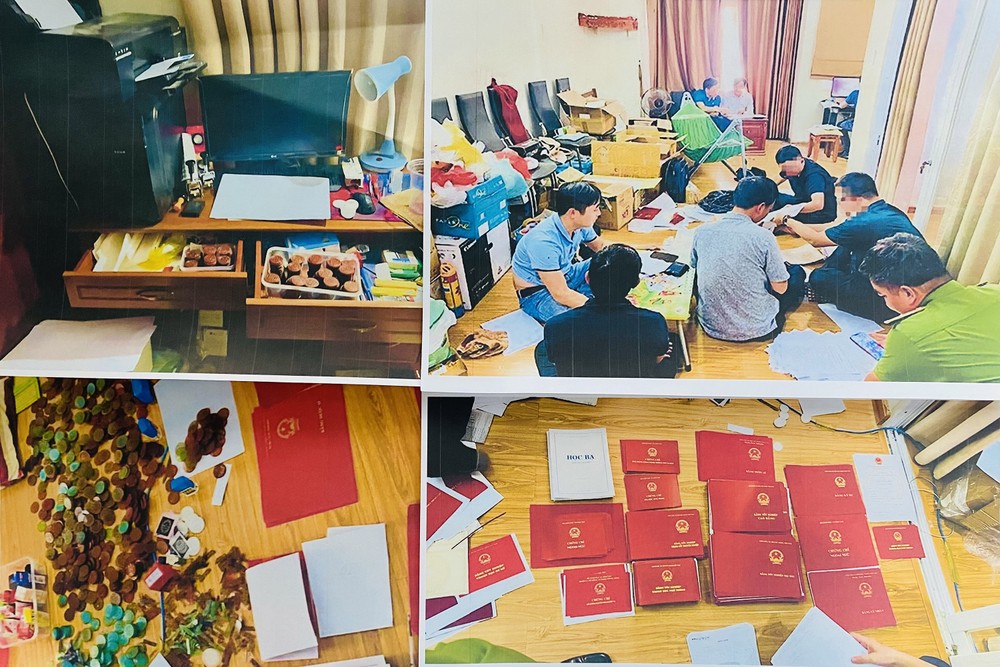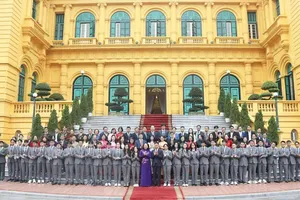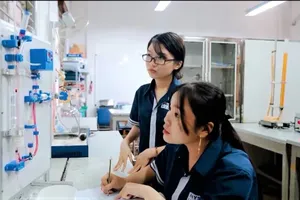
However, this issue is not widely disclosed, creating loopholes for individuals intentionally engaging in the buying and usage of fraudulent diplomas and certificates.
Widespread presence of counterfeit degrees, certificates
According to Mr. Nguyen Van Duong, former Deputy Head of the Training Department at HCMC University of Economics, currently, there are many undergraduate degrees (regular training) from the university that have been forged. During his tenure, the university routinely responded to requests for degree verification, uncovering 5-7 cases of forgery each week. Despite the university's implementation of language proficiency standards, including international certificates and rigorous checks, there were still students acquiring counterfeit certificates for submission.
Many other universities, such as HCMC University of Agriculture and Forestry, Industrial University of HCMC, Can Tho University, and HCMC University of Science (Vietnam National University - HCMC), have also reported instances of forged degrees from their institutions and fake international language proficiency certificates.
Even at the intermediate level, the principal of a trade school in Cu Chi District (HCMC) has revealed that during the graduation assessment for students, the school's council has identified several cases of students using counterfeit high school diplomas and suspicious foreign language and IT certificates. The school has officially contacted the institutions that issued these certificates to verify their authenticity. The principal emphasized that if the degrees and certificates are confirmed to be fraudulent, the student's academic results will be nullified, and the cases will be forwarded to the appropriate authorities for further action.
Recently, the police in Thu Duc City (HCMC) successfully disrupted a criminal operation specializing in forging citizens' identity cards, driver's licenses, university degrees, and certificates for inland waterway vehicle expertise. During the search of the suspects' residences, authorities seized nearly 300 types of suspected forged documents, including driver's licenses, master's degrees, and university degrees, along with various machines and equipment used in the counterfeit of fake diplomas and certificates.
Earlier, the Department of Cybersecurity and High-tech Crime Prevention, in collaboration with the police forces of Thanh Hoa Province and HCMC, also dismantled a network involved in the forgery and trade of counterfeit diplomas and documents. Upon inspection of three locations in HCMC, the police confiscated two computers, 20 mobile phones, 1,000 fake seals, 3,000 fake stamps, 6,000 fake diploma blanks, 1,100 printed fake diplomas, as well as numerous color printers, scanners, and plastic laminators used for the production of counterfeit diplomas and documents.
Publicizing and digitalizing management
According to Assoc. Prof. - Dr. Bui Hoai Thang, Head of the Training Department at the HCMC University of Technology (Vietnam National University-HCMC), the process of verifying degrees and certificates is currently conducted swiftly and efficiently in response to requests from authorized agencies, following proper procedures. Typically, the university responds within 1-3 working days. Current regulations also require institutions to publicly disclose the list of awarded degrees for convenient verification while ensuring the security of personal data. "We need to raise social awareness and rigorously address cases involving the use of counterfeit documents, including fake diplomas. When verification is required, units should employ legitimate methods to enhance legal compliance and seriousness. In cases of detecting fake degrees, units must notify relevant parties and report to authorized agencies for legal processing," said Assoc. Prof. - Dr. Bui Hoai Thang.
The utilization of modern technology in the issuance and backup processes of diplomas is a crucial measure in preventing the use of counterfeit credentials. In recent years, there has been a strong push towards digitalization to enhance the efficiency of diploma management and verification, significantly contributing to the fight against the use of fake credentials. This effort is gradually further improved with the incorporation of new technological techniques, making diploma verification faster and more convenient.
Dr. Thai Doan Thanh, Vice Rector of HCMC University of Industry and Trade, said that universities are adhering to Circular No.21/2019/TT-BGDDT, which provides regulations for managing junior high school diplomas, high school diplomas, certificates for pedagogical intermediate education, certificates for pedagogical college education, university education diplomas, and certificates within the national education system. The verification and response regarding diplomas and certificates are among the responsibilities of educational institutions. To streamline the verification process, two synchronized solutions must be implemented. Firstly, all diploma and certificate data must be integrated into the management software system to enable educational institutions to respond promptly to verification requests. Secondly, diploma data should be publicly accessible on the educational institution's information portal, making it easy for individuals and organizations to conduct verification.
According to Assoc. Prof. - Dr. Tran Dinh Ly, Vice Rector of HCMC University of Agriculture and Forestry, students and learners who buy or use fake degrees for any reason are unequivocally breaking the law, so they must say “No” to fake diplomas. In fact, numerous universities have adopted stringent measures, including a strict penalty of a 2-year exam ban for those caught using counterfeit certificates, including international language proficiency certificates. It also means that students possibly face the cancellation of their academic results.
























